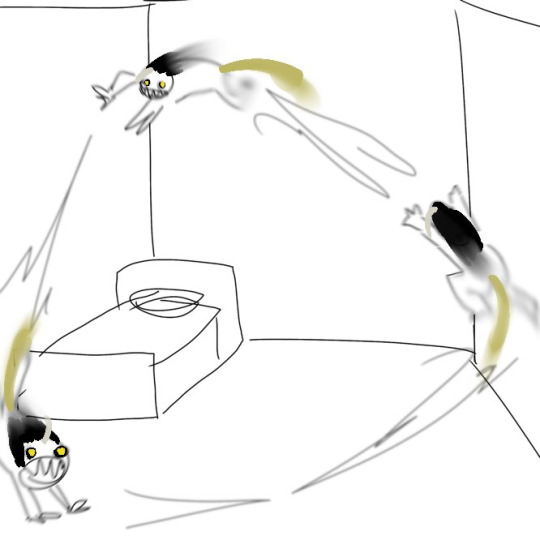Text
they should invent a job application that gets responses
414 notes
·
View notes
Text
Americans will measure in anything but the metric system

25 notes
·
View notes
Text

Obsessed with Outlaw arming Texas with sci-fi future tech
61 notes
·
View notes
Text
died and i came back normal. more normal than before even. such a regular guy it’s freaking everyone out. i’m ironing my shirts & doing the sunday paper crossword puzzle and the people i love won’t stop crying
10K notes
·
View notes
Text
Top scientists at MIT have announced a mushroom that hates
1K notes
·
View notes
Text
ace: ok today is going to be a chill day since we've got such a busy weekend ahead. just, y'know. relaxing time.
✖️:

5 notes
·
View notes
Text
i think the reason i don't really do well with the pomodoro technique is that actually i need something like. 50/10 (10 minutes of work, 50 minutes of relaxation) :')
- ace
6 notes
·
View notes
Text
I've reached 35 responses! They're very interesting, but the sample size is still small, and I don't think it's at all representative of the Tumblr autism community. If I can't reach at least 100 responses, I don't think I'll be able to analyze Tumblr community views on support needs in depth. I'll still post descriptive statistics for the overall sample, but I won't have the statistical power to do anything else.
I'd really appreciate if everyone could help by taking the survey and reblogging this post to their followers!
As a reminder, the survey is meant to understand how people use support needs labels. For example, what makes someone low support needs and not moderate support needs? The survey also helps show what the community is like in general in terms of demographics and experiences!
A summary of the current survey results are under the Read More. Again, especially if a community that you're in is under-represented, please help by spreading the survey link! I'd especially love to hear from more people AMAB, racial/ethnic minorities, people who are not yet diagnosed or were diagnosed as adults, and higher support needs individuals!
Age: Most participants are young; 60% are under age 25%, and 20% are under 18.
Gender: Over half of the sample is AFAB nonbinary, almost 1/3 is trans men, and almost all of the remainder (14%) is cis women. Only 2 people who are AMAB have taken the survey.
Race/Ethnicity: Non-Hispanic White people are very over-represented, making up 82% of the sample.
Diagnosis: 57% are professionally diagnosed, 20% are informally or soft-diagnosed, and 14% are seeking a diagnosis. Only 9% are neither diagnosed nor seeking a diagnosis.
The most common diagnoses are ASD with no level (33%), level 1 ASD (25%), and "mild autism" (13%).
16% were diagnosed before age 8, 24% between ages 9 and 15, 32% between ages 16 and 18, 12% between ages 19 and 25, and 16% over age 25.
Autism Support Needs: The most common self-identified support needs label is "low-moderate" (43%), followed by low (23%) and moderate (14%). Most would benefit from but do not need weekly support (31%), only need accommodations and mental health support (17%), or rarely need any support (6%).
Autism Symptoms: On a severity scale of 0 (not applicable) to 3 (severe), the average is 1.7 overall, 1.8 socially, and 1.7 for restricted-repetitive behaviors. The most severe symptom is sensory issues (2.1), and the least severe are nonverbal communication and stimming (both 1.5).
83% are fully verbal, and 97% have no intellectual disability.
38% can mask well enough to seem "off" but not necessarily autistic. 21% can't mask well or for long.
Most experience shutdowns (94%), difficulties with interoception (80%), meltdowns (71%), alexithymia (71%), echolalia (69%), and autistic mutism (66%). Very few experience psychosis (14%) or catatonia (11%).
Self-Diagnosis: 20% think it's always fine to self-diagnose autism, 29% think it's almost always fine, 31% think it's only okay if an assessment is inaccessible, 71% think it needs to be done carefully, and 11% think it's okay to suspect but not self-diagnose.
15% think it's always fine to self-diagnose autism DSM-5 levels (including if the person has been told they don't have autism), 15% think it's fine as long as autism hasn't been ruled out, 21% think it's almost always fine, 18% think it's only okay if an assessment is inaccessible, 36% think it needs to be done carefully, and 36% think it's okay to suspect but not self-diagnose.
26% think it's always fine to self-diagnose autism support needs labels (including if the person has been told they don't have autism), 29% think it's fine as long as autism hasn't been ruled out, 37% think it's almost always fine, 29% think it's only okay if an assessment is inaccessible, 43% think it needs to be done carefully, and 6% think it's okay to suspect but not self-diagnose.
Disability: 71% feel disabled by autism, 17% feel disabled by another condition but not autism, and 11% are unsure.
Comorbidities: The most common mental health comorbidities are anxiety (68%), ADHD (62%), and depression (56%).
The least common mental health disorders are schizophrenia spectrum disorders (0%), bipolar disorders (3%), tic disorders (6%), substance use disorders (6%), personality disorder (9%), and OCD (9%).
The most common physical health comorbidities are gastrointestinal issues (29%), connective tissue disorders (29%), autoimmune disorders (24%), neurological disorders or injuries (24%), and hearing/vision loss (24%). All others are below 20%.
Overall Support Needs: When considering comorbidities, the most common self-identified support needs label is moderate (37%), followed by low-moderate (31%) and low (17%).
299 notes
·
View notes
Text

out of context authority by jeff vandermeer
9 notes
·
View notes
Text




Season 2 let's go!! So, the bear is a mascot of WB. Right??
(Season 1 covers for ech episode: 1-6, 7-9, 10-12)
@picturemecountingcards thanks as always for spelling check.
40 notes
·
View notes
Text
the other aspect of "the director is the framing narrative for the entire series" is our idea that Control basically startled Area X
you write this guy off as an uninteresting rabbit, focus instead on your dear spy Ghost Bird, then suddenly you turn around and while you weren't looking (recall, this is narrated in the past perfect, not "as it's happening") this guy has gotten past the Crawler and accomplished what even the biologist hadn't by stepping through the door
so you go "wait, hold up, how the hell did we get here" and retroactively (because, you know, time doesn't mean anything to it lol) construct Authority out of the human-sized perspective offered by the director
if that makes sense?
- ace
5 notes
·
View notes
Text

64K notes
·
View notes
Text
yes hello i have Thoughts about this
essentially: second person perspective feels like it's constructed in the SR books to be the "closest" POV (in contrast with first person, which is traditionally often thought of as "the closest POV" but in these books is right out the gate associated with unreliability if not outright deception). the director has this very, uh, direct connection with Area X, that is best reflected through this close POV.
more specifically, Area X itself seems deeply tied with narrative (for... other reasons i could absolutely go into, lol), and through trying to understand things by way of narrative. the best way to do that would be to put yourself in the shoes of some character, right? the biologist (and by association, Ghost Bird) wouldn't make a good POV character for Area X to adopt, because she's too much like Area X itself, too inhuman. Control is literally uninteresting. but the director has this deeper connection through her childhood, so you could imagine Area X itself turning its narrative gaze directly towards her and going "you. you do this. you think that."
on a broader level, it's kinda my opinion that all of Acceptance if not also all of Authority is from her POV as a framing device of sorts, while she's dying on the beach and having her perspective "adopted" by Area X so it can better understand humans. and once again, this being the "closest" POV to the reader means it's best done through second, not first person.
- ace
does anyone have Thoughts about the director’s chapter in acceptance being written in second person? it’s intriguing me but i know jack shit about literary analysis 👍👍
#reasons i am admittedly mildly disappointed that Lowry's POV is apparently third person lol#maybe second person Lowry would've been just a bit too much#the real area x was the ghosts that haunted us along the way
35 notes
·
View notes
Text
Automatisms — XX14: Disposition
“The stages you’ve seen described are identification, indoctrination, reinforcement, and deployment, but Grace has seen other documents that borrow the semiotics of the supernatural: ‘manifestation, infestation, oppression, and possession.’”
Or: what if the Lowry in Control’s head was more than figurative?
Fandom: The Southern Reach Trilogy - Jeff Vandermeer
Rating: Mature
Category: Gen
Archive Warnings: Graphic Depictions Of Violence
Additional Tags: Multiplicity/Plurality, Alternate Universe - Canon Divergence, Canon-Typical Body Horror, Self-Harm, Ambiguous Spirit Possession
(*kicks this chapter out the door* and STAY out -ace)
#jeff vandermeer#southern reach#annihilation#the real area x was the ghosts that haunted us along the way#automatisms#this will hopefully probably be the hardest chapter#the rest i have at least some idea of what im doing lol#until part 6. we don't talk about part 6.#presumably by then Absolution will be out to have given me a bunch of new ideas! what a weird thought.#technically this chapter is already inspired a lot by Absolution tidbits lol
3 notes
·
View notes
Text
i am Struggling on this next part of Automatisms and im going to just pretend that it's thematic. of course it's hard to write about Control and Lowry alone in Area X; Area X didn't find Control interesting, after all
or something
- ace
4 notes
·
View notes
Text
she has that sadness in her eyes that you only see in alcoholic captains of doomed arctic expeditions
24K notes
·
View notes
